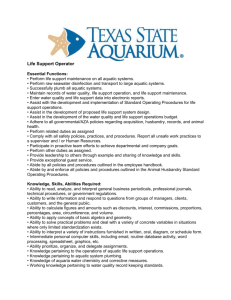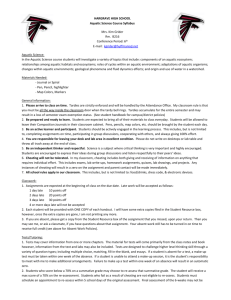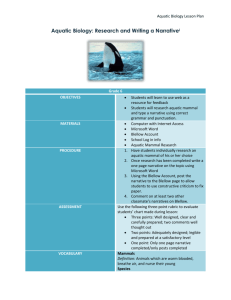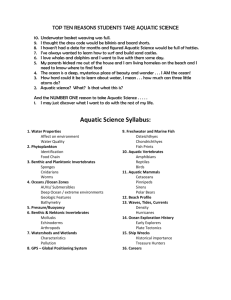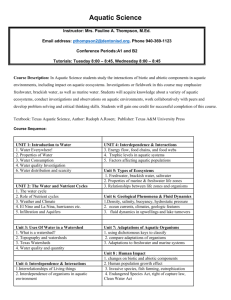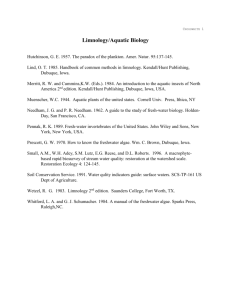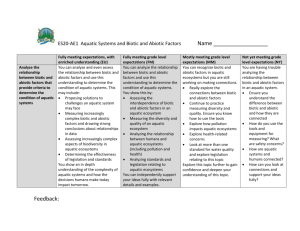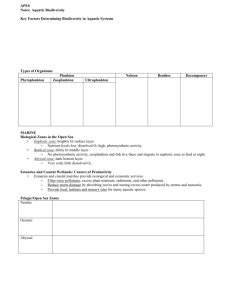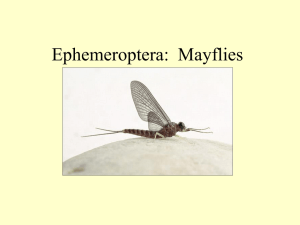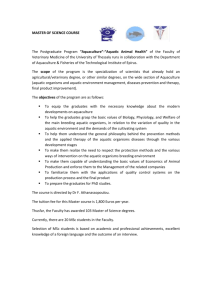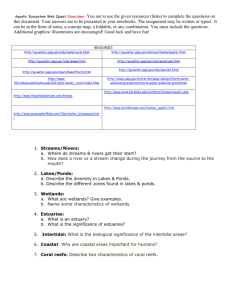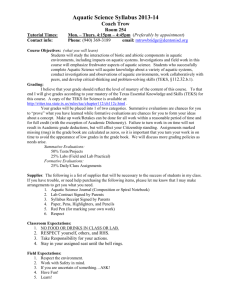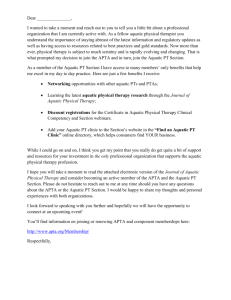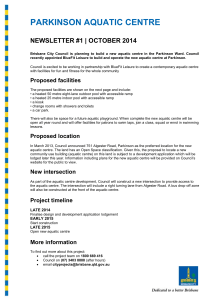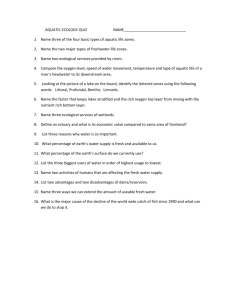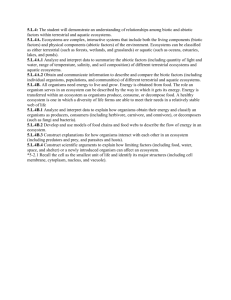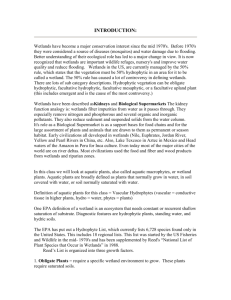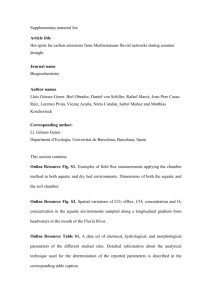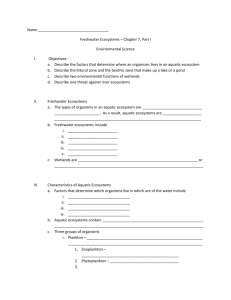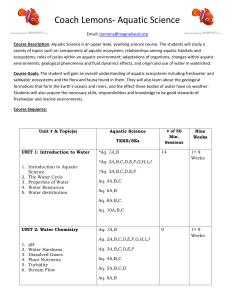Aquatic Science Harlingen High School South
advertisement
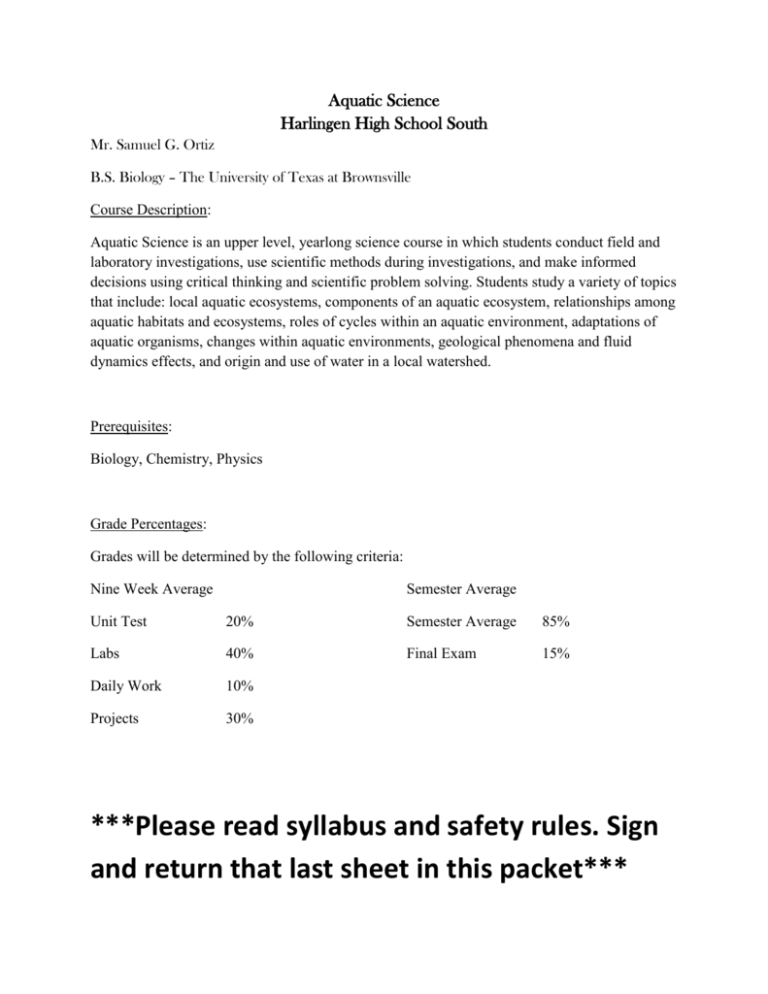
Aquatic Science Harlingen High School South Mr. Samuel G. Ortiz B.S. Biology – The University of Texas at Brownsville Course Description: Aquatic Science is an upper level, yearlong science course in which students conduct field and laboratory investigations, use scientific methods during investigations, and make informed decisions using critical thinking and scientific problem solving. Students study a variety of topics that include: local aquatic ecosystems, components of an aquatic ecosystem, relationships among aquatic habitats and ecosystems, roles of cycles within an aquatic environment, adaptations of aquatic organisms, changes within aquatic environments, geological phenomena and fluid dynamics effects, and origin and use of water in a local watershed. Prerequisites: Biology, Chemistry, Physics Grade Percentages: Grades will be determined by the following criteria: Nine Week Average Semester Average Unit Test 20% Semester Average 85% Labs 40% Final Exam 15% Daily Work 10% Projects 30% ***Please read syllabus and safety rules. Sign and return that last sheet in this packet*** Tutoring Schedule: Morning: Afternoon: Monday – Thursday : 7:45am – 8:05am Monday – Wednesday – Thursday : 4:05pm – 4:30pm I will also be available for tutoring any day by appointment. Some tutoring days may coincide with mandatory faculty or department meetings, so tutoring days may be cancelled. I will try my best to inform you of those days to prevent confusion. Materials: 1 bound composition or lab notebook Paper Pen and Pencil Scientific Calculator (optional) Flash Drive Classroom Rules: 1. Respect and courtesy must be shown to all class members at all time. Any grievances can be brought to my attention in a private manner. 2. Punctuality and preparedness upon arrival to class is a must. Please let me know ahead of time if you will be late or if you forgot something. I may allow. I may allow the tardiness or the lack of required materials at my discretion. 3. Follow all instructions as they are given. Any deviation from my instructions may be interpreted as insubordination for which there is a consequence. 4. For your safety, do not eat or drink at lab stations. 5. Unless told, you are not allowed to speak or communicate with others while I am speaking. This includes cell phones and other electronic devices. Consequences: 1st infraction: Verbal Warning nd 2 infraction: Lunch detention. Possible parent/guardian contact rd 3 infraction: referral to office. Outrageous, extremely inconsiderate, or unsafe behavior results in immediate dismissal from the classroom and a referral to the office. Cheating: Zero Tolerance Policy: That means that it is not tolerated for any assignment and all parties involved will receive a grade of 0, which cannot be made up or dropped. Retests: A retest may only be administered if 25% grades are failing. Absences: Students will have the same number of days absent to turn in assignments missed because of an excused absence. Students absent only the day before a test must take the test as scheduled. Students are responsible for collecting any and all make-up work from the teacher. Tardy Policy: Same as school policy. See Student Handbook for more information. School phone number: (956) 427-3800 Email: samuel.ortiz@hcisd.org Unit 1: Lab Safety and Scientific Method 1. General lab procedures and safety 2. Laboratory equipment 3. Scientific Method 4. Metric Conversions 5 Days Unit 2: Hydrology 1. Properties of water a. Chemical Structure b. Cohesion/adhesion c. Density/Specific Gravity d. Specific Heat 2. Water Cycle a. Hurricanes 15 days Unit 3: Water Quality 15 days 1. Acids and Bases 2. Water Measurements a. Temp b. pH c. Turbidity/Suspended Sediment d. DO/DCO e. Nitrates/Phosphates f. Hardness/Conductance(TDS) g. Salinity h. Stream Flow 3. Pollutants a. Fecal Coliform b. Heavy metals and other pollutants Unit 4: Basics of Ecology and Taxonomy 1. Ecological Hierarchy 2. Energy Transfer 3. Biogeochemical Cycles 4. Taxonomy a. Microorganisms b. Invertebrates c. Chordates 17 days Unit 7: Oceanography 1. Sedimentation a. Depositional Shores *Texas Coasts b. Erosional Shores 2. Ocean Floor Features 3. Plate Tectonics (Geology) 21 days Unit 5: Limnology and Rivers 1. Limnology Fundamentals 2. Abiotic features of Rivers a. Sedimentation and Erosion b. Stream Types/Characteristics c. Water Sheds (Rio Grande/Arroyo Colorado) 3. Biotic Features of Rivers a. Microorganisms b. Macroorganisms 17 days Unit 8: Water Dynamics 1. Waves a. Wave Features b. Wave Calculations c. Wave Types d. Tsunami 2. Tides 3. Currents 4. Pressure 21 days Unit 6: Ponds, Lakes and Wetlands 1. Abiotic Features of Lakes a. Formation and Types 2. Biotic Features of Lakes a. Microorganisms b. Macroorganisms 3. Abiotic Features of Ponds/Wetlands a. Formation and types b. Groundwater 4. Biotic Features of Ponds/Wetlands a. Microorganisms b. Macroorganisms 21 days Unit 9: Marine Ecology 1. Coral Reefs 2. Kelp Forests 3. Sea Grass Beds 4. Open Ocean 5. Abyssal Plains 6. Hydrothermal Vents 25 days Unit 10: Human Impact and Conservation: 20 days 1. Conservation Laws 2. Global Warming/Ocean Acidification 3. Pollution/Human Economic and Social Impacts
